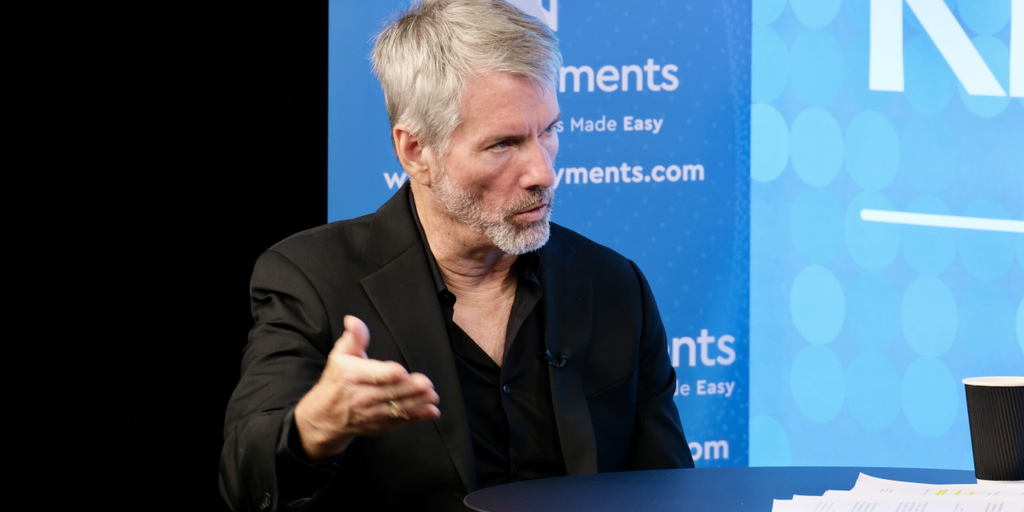business
Crypto Fundraising Platform Legion Taps Blueprynt to Foster MiCA-Compliant ICOs in EU
Published
6 months agoon
By
admin

Crypto fundraising platform Legion announced Monday that it has teamed with startup Blueprynt to add compliance solutions that enable developers in the EU to comply with MiCA rules when conducting token sales—without relying on a slew of lawyers.
Blueprynt founder and CEO Chris Brummer told Decrypt in an interview that the partnership centers on driving down compliance costs. Whether it’s drafting white papers in a proper format, or coloring them in with on-chain data, he described Blueprynt as an end-to-end solution.
“My goal has been to free up entrepreneurs to concentrate on their vision and put their capital toward its best use,” Brummer said. “Blueprynt is basically developing software to translate regulatory requirements into a very user-friendly process.”
While white papers have a long-standing history in settings such as academia, they’ve become a staple for developers explaining how their projects work in the crypto space. At the same time, Brummer, a Georgetown University Law professor, said that white papers can serve as a means of developing investor interest, with varying degrees of accuracy or attention to detail.
Under Markets in Crypto-Assets Regulation (MiCA) rules in the EU, white papers became a requirement for projects selling tokens or raising capital as of June, with a robust set of disclosure requirements and minimum standards. For small projects, Brummer said that the costs associated with producing a compliant white paper can become prohibitive, easily pushing upwards of €50,000 (about $54,000).
Blueprynt aims to streamline the process of extracting and formatting on-chain data, creating white papers that can be reviewed by lawyers on an accelerated basis. Brummer estimated that the cost of complying with MiCA was reduced through Blueprynt by 70% in practice.
Founded in 2021, Legion aims to provide retail investors with better access to on-chain fundraising efforts. Effectively, it’s putting a regulatory compliant spin on Initial Coin Offerings (ICO), first popularized by Ethereum in 2016, alongside billions thrown at other projects.
Last week, Legion unveiled an investor scoring system, enabling founders to assess prospective investors’ contributions to other projects. Alongside the tie-up with Blueprynt, Legion founder Matt O’Connor said that the fundraising platform is further democratizing on-chain raises.
“Today’s market is full of projects that are capital rich, but community poor,” he said in a statement. “With MiCA-compliant white papers and a licensed platform for retail investors, teams can now include value-add users at the earliest fundraising stages.”
In the U.S., ICOs are largely unregulated, while the Securities and Exchange Commission (SEC) has called upon token issuers to come in and register. Carrying the risk of litigation, Brummer described the process of issuing tokens in the U.S. as a high-stakes scenario.
“It’s not easy,” he said. “The requirements that are in place don’t always fit the instrument, and that does neither regulators nor investors very much good.”
While the registration process in the U.S. could ask projects about their corporate governance, it doesn’t cover decentralized governance through DAOs. Additionally, audited financial statements could be an area of focus, while core crypto aspects like tokenomics aren’t.
Depending on whether digital assets regulation is passed following the U.S. presidential election, as some lawmakers have promised, regulatory requirements could shift soon. Meanwhile, Brummer described standardized white papers as a nod to crypto’s roots in the EU.
“They’re are many different ways in which information provided by projects will be coming under some kind of regulatory oversight,” Brummer said. “We started with the white paper because it was a great sort of proof-of-concept—the Europeans have been very forward-looking.”
Edited by Andrew Hayward
Daily Debrief Newsletter
Start every day with the top news stories right now, plus original features, a podcast, videos and more.
Source link
You may like


XRP Price Shoots For 20% Surge To $2.51 Amid Pullback To Breakout Zone


Stocks edge higher ahead of big earnings week


Here’s How Bitcoin Could Boost Demand for US Treasuries, According to Macro Guru Luke Gromen


Experts Predict US Recession in 2025 if Trump-China Trade War Tariffs Stay


Monero Jumps 51% After ‘Suspicious Transfer’ of $333M in Bitcoin


ZachXBT flags suspicious $330M Bitcoin transfer triggering Monero surge
business
Strategy Boosts Bitcoin Holdings Above $47 Billion With Latest Buy
Published
7 days agoon
April 21, 2025By
admin

In brief
- Strategy purchased 6,500 Bitcoin last week, padding its corporate coffers by $556 million.
- Tysons, Virginia-based Strategy (formerly MicroStrategy) now owns 538,000 Bitcoin worth $47.2 billion.
- Strategy said the acquisition was made using proceeds from two recent equity offerings.
Strategy, formerly known as MicroStrategy, purchased 6,500 Bitcoin last week, padding its corporate coffers by $556 million, according to a Securities and Exchange Commission filing.
The Tysons, Virginia-based firm now owns 538,000 Bitcoin worth $47.2 billion following Bitcoin’s climb above $88,000 on Sunday, according to crypto data provider CoinGecko. The software firm said it scooped the asset up for an average price of $84,800 last week.
Strategy said the acquisition was made using proceeds from two recent equity offerings: the firm received $548 million in proceeds by issuing Class A common shares, while Strategy also gained $8 million from the sale of its so-called perpetual “STRK” preferred stock.
Uncertainty surrounding U.S. President Donald Trump’s trade war has weighed on risk assets in recent weeks, as economists pencil in slower growth and higher costs for consumers in the U.S., yet Strategy has bought Bitcoin fairly consistently since mid-March. Over the past six Mondays, Strategy has said that it bought Bitcoin on five of them.
The size of Strategy’s recent Bitcoin purchases has varied, however. After buying $11 million worth of Bitcoin in mid-March, it spent $1.9 billion on Bitcoin two weeks later, per Saylor Tracker.
Strategy’s shares were recently trading at about $322, up 1.6% on the day, according to Nasdaq. The stock changed hands as high as $328 during pre-market trading on Monday but plunged as low as $317 after the opening bell.
On Sunday, Strategy co-founder and Executive Chairman Michael Saylor noted on X, formerly Twitter, that the company isn’t a niche option for gaining exposure to Bitcoin’s price anymore.
Based on public data, 13,000 institutions hold Strategy’s stock directly, along with 814,000 accounts tied to retail investors, he said. In addition, Saylor said 55 million investors have “indirect exposure through ETFs, mutual funds, pensions, and insurance portfolios.
Strategy was added to the Nasdaq 100 in December, a milestone placing it within the coveted ranks of tech giants like Apple and Meta. The company may also join the S&P 500 one day, but Strategy’s lack of consistent profits is currently a barrier, based on inclusion criteria.
Edited by James Rubin
Editor’s note: This story was updated to ensure pricing consistency throughout.
Daily Debrief Newsletter
Start every day with the top news stories right now, plus original features, a podcast, videos and more.
Source link
business
Strategy Buys More Bitcoin as Tariff Exemptions Send Tech Stocks Soaring
Published
2 weeks agoon
April 14, 2025By
admin

Strategy, formerly known as MicroStrategy, acquired around 3,450 Bitcoin worth $286 million last week, the company said in a Securities and Exchange Commission filing.
Unveiling a Bitcoin purchase for the third straight Monday, the Tysons, Virginia-based firm now owns 531,644 Bitcoin worth $45.2 billion, based on the asset’s current price.Strategy paid an average price of $82,600 per Bitcoin last week, it added.
Strategy, which has shifted its focus from software development to become a Bitcoin treasury, said it meanwhile sold one million Class A common shares through an at-the-money offering program unveiled in October. Under the initiative, Strategy said it can still issue an additional $2 billion worth of common shares, alongside swaths of preferred perpetual stock.
Strategy’s shares rose 4% on Monday to around $312, as the tech-heavy Nasdaq surged 1.5%, adding on to last week’s recovery after the White House said smartphones and computers would be exempt from sweeping levies, including 125% taxes on Chinese goods, per Nasdaq.
Monday’s price action represents a dramatic turnaround after investors navigated outsized uncertainty last week, including a disclosure from Strategy that it may ultimately need to sell Bitcoin to meet its financial obligations. Amid tariff-linked concerns, Strategy’s shares fell as low as $236, or around 32% below their opening on Monday.
“No Tariffs on Orange Dots,” Strategy co-founder and Executive Chairman Michael Saylor said on X, formerly Twitter, on Sunday, referring to the way Bitcoin buys look on Saylor Tracker.
The price of Bitcoin was recently changing hands around $85 on Monday, showing a roughly 8.3% increase of the past week, according to CoinGecko. Over the past month, it’s virtually flat.
Strategy has become the world’s largest corporate holder of Bitcoin since it began accumulating the asset in 2020. Over time, as it has embraced its role as a Bitcoin treasury firm, Strategy has issued billions of dollars in debt to buy more Bitcoin than it could otherwise.
The Nasdaq-listed firm’s 531,600 Bitcoin tower over the next largest corporate holder, Bitcoin miner Marathon Digital, which is around 47,500 Bitcoin, according to Bitcoin Treasures. As of this writing, Strategy’s stash accounted for more than 2.5% of Bitcoin total supply.
The Tokyo-based investment firm Metaplanet, which began buying Bitcoin last May, said on X on Monday that it had recently bought 319 Bitcoin worth $27 million. The company said in an update that it now holds 4,525 Bitcoin worth around $385 million.
Among publicly traded companies, MetaPlanet is currently the 10th largest Bitcoin holder, according to Bitcoin Treasuries.
Edited by James Rubin
Daily Debrief Newsletter
Start every day with the top news stories right now, plus original features, a podcast, videos and more.
Source link
business
Japan’s Metaplanet Buys Another $26M in Bitcoin Amid Tariff Market Uncertainty
Published
2 weeks agoon
April 14, 2025By
admin

Metaplanet, the Tokyo-listed firm dubbed “Asia’s MicroStrategy,” has boosted its Bitcoin holdings with a fresh 3.78 billion yen ($26.3 million) purchase amid growing tension over U.S. trade tariffs.
The company said it acquired 319 BTC at an average price of 12,849,780 yen ($82,549) per coin, bringing its total holdings to 4,525 BTC. Metaplanet plans to boost its Bitcoin holdings by 470%, targeting a total of 10,000 BTC by year-end.
The timing of the purchase comes as digital assets falter under geopolitical pressure. Bitcoin dropped more than 2% on Sunday during Asia trading hours, sliding to $83,482 as investors digested conflicting signals from Washington over the direction of U.S. trade policy toward China.
Traditional markets remained resilient despite a flurry of comments from the Trump administration regarding new tariffs on Chinese electronics. Nasdaq 100 futures rose over 1% in early trading, while S&P 500 futures climbed 0.7%.
While smartphones and semiconductors were temporarily excluded from a proposed 10% “reciprocal” tariff, President Trump clarified late Sunday on Truth Social that the same products will remain subject to a separate 20% national security levy.
Commerce Secretary Howard Lutnick said further sector-specific tariffs are expected within the next two months.
By Monday, 1 a.m. ET, Bitcoin was up just 0.4% over the last 24 hours, trading at $84,990, according to CoinGecko. Ether was up 1.8% to $1,638 over the same period. The top ten cryptocurrencies by market cap have all posted slight gains or no change.
Metaplanet has leaned heavily into Bitcoin as its core treasury asset. Last month, the company appointed Eric Trump, son of the U.S. president, to its newly formed Strategic Advisory Board, citing his “business expertise and passion for Bitcoin.”
Metaplanet is positioning itself in the mold of Michael Saylor’s Strategy, whose aggressive Bitcoin accumulation strategy has influenced a growing number of publicly listed firms to follow suit.
At the same time, the Trump administration has launched two separate initiatives: a Strategic Bitcoin Reserve, funded by seized BTC and held as a permanent national asset, and a U.S. Digital Asset Stockpile, which includes other confiscated crypto with potential for liquidation or strategic use.
Edited by Sebastian Sinclair
Daily Debrief Newsletter
Start every day with the top news stories right now, plus original features, a podcast, videos and more.
Source link

XRP Price Shoots For 20% Surge To $2.51 Amid Pullback To Breakout Zone

Stocks edge higher ahead of big earnings week

Here’s How Bitcoin Could Boost Demand for US Treasuries, According to Macro Guru Luke Gromen

Experts Predict US Recession in 2025 if Trump-China Trade War Tariffs Stay

Monero Jumps 51% After ‘Suspicious Transfer’ of $333M in Bitcoin

ZachXBT flags suspicious $330M Bitcoin transfer triggering Monero surge

Monero’s XMR Rockets 40% as XRP Leads Crypto Majors Gains

The 5 top crypto loan platforms of 2025

XRP Price Shows Strength — Breakout Above Key Levels Possible?

Expert Reveals Why The Ethereum-To-Bitcoin Ratio Is Falling

Analyst Says Solana-Based Memecoin Going Much Higher, Sees PENGU Facing ‘True Test’ After April Surge

Nike sued for $5 million over its shutdown of NFT platform RTFKT

Biological Age vs. Chronological Age: Redefining Age in the Digital Era

TRUMP whale regrets sale, pays double to buy back meme coins

Stripe Tests New Stablecoin Project as $3.7T Market Looms

Arthur Hayes, Murad’s Prediction For Meme Coins, AI & DeFi Coins For 2025

Expert Sees Bitcoin Dipping To $50K While Bullish Signs Persist

3 Voting Polls Show Why Ripple’s XRP Price Could Hit $10 Soon

Aptos Leverages Chainlink To Enhance Scalability and Data Access

Bitcoin Could Rally to $80,000 on the Eve of US Elections

Crypto’s Big Trump Gamble Is Risky

Institutional Investors Go All In on Crypto as 57% Plan to Boost Allocations as Bull Run Heats Up, Sygnum Survey Reveals

The Future of Bitcoin: Scaling, Institutional Adoption, and Strategic Reserves with Rich Rines

Sonic Now ‘Golden Standard’ of Layer-2s After Scaling Transactions to 16,000+ per Second, Says Andre Cronje

Ripple-SEC Case Ends, But These 3 Rivals Could Jump 500x

Has The Bitcoin Price Already Peaked?

A16z-backed Espresso announces mainnet launch of core product

Xmas Altcoin Rally Insights by BNM Agent I

Blockchain groups challenge new broker reporting rule

I’m Grateful for Trump’s Embrace of Bitcoin
Trending

 24/7 Cryptocurrency News6 months ago
24/7 Cryptocurrency News6 months agoArthur Hayes, Murad’s Prediction For Meme Coins, AI & DeFi Coins For 2025

 Bitcoin3 months ago
Bitcoin3 months agoExpert Sees Bitcoin Dipping To $50K While Bullish Signs Persist

 Ripple Price1 month ago
Ripple Price1 month ago3 Voting Polls Show Why Ripple’s XRP Price Could Hit $10 Soon

 24/7 Cryptocurrency News4 months ago
24/7 Cryptocurrency News4 months agoAptos Leverages Chainlink To Enhance Scalability and Data Access

 Bitcoin6 months ago
Bitcoin6 months agoBitcoin Could Rally to $80,000 on the Eve of US Elections

 Opinion6 months ago
Opinion6 months agoCrypto’s Big Trump Gamble Is Risky

 Bitcoin6 months ago
Bitcoin6 months agoInstitutional Investors Go All In on Crypto as 57% Plan to Boost Allocations as Bull Run Heats Up, Sygnum Survey Reveals

 Bitcoin3 months ago
Bitcoin3 months agoThe Future of Bitcoin: Scaling, Institutional Adoption, and Strategic Reserves with Rich Rines


